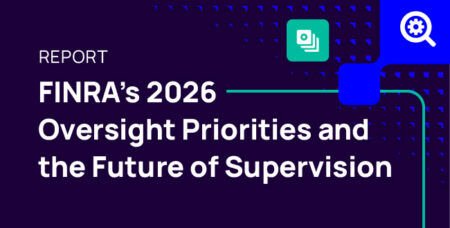Fall 2025 Financial Conferences Reveal the Rules That Will Shape 2026
TL;DR: Fall 2025 financial services conferences highlighted key compliance trends for 2026, from crypto regulation and AI governance to recordkeeping reforms and off-channel communication risks. Firms should start preparing now for these evolving regulatory priorities.
Just wrapping up what is the high point of the US financial services industry conference season, including SIFMA C&L Northeast, FINRA Small Firm, NSCP, and the SIFMA Annual conference. We’ve taken away some strong signals that will shape regulatory compliance into 2026. While the ongoing government shutdown, murky economic projections, and progress toward regulatory simplification shared the headlines, many topics will directly impact a firm’s controls over the use of electronic communications. We share those themes below.
Why these Fall 2025 Financial Conference insights matter
Understanding the signals from the fall 2025 conferences is critical for financial services firms navigating an evolving regulatory landscape. Simplification efforts, emerging crypto regulations, AI governance, and off-channel communication risks will directly impact compliance programs, operational processes, and risk management strategies in 2026. Firms that act early can streamline controls, reduce regulatory exposure, and stay ahead of industry trends before new rules take effect.
Regulatory simplification: SEC and FINRA plans to reduce compliance burden
Similar to what we noted from the AFME C&L Conference in London, regulatory relief and identifying opportunities to reduce the burden of compliance is a theme for both the SEC and FINRA. As SEC Chairman Atkins noted at SIFMA Annual, “it’s time for spring cleaning and a recalibration of the rulebook.”
While specifically mentioning only potential streamlining of Regulation S-K, other specific action could follow industry roundtables currently underway. Additionally, FINRA announced a re-organization with the goal of improving internal efficiency and response time to the industry in support of the goal of simplification.
Government shutdown impacts on financial compliance and enforcement
“It’s over when it’s over” was as much of a signal as could be detected from regulators, economists and compliance executives, riding an AI-fueled stock market wave while whistling past the implications of what is now the longest shutdown in US history. While briefly noting the furlough of enforcement staffs of the SEC, CFTC and other regulatory bodies, the most common characterization of the current situation was “when we get back.”
Now that it is over, regulators are already facing staff shortages from voluntary staff reductions at the SEC and FINRA, the future of the Consumer Financial Protection Bureau (CFPB) remains unclear, and the lack of government economic data makes predictions for economic growth, inflation, and other policy signals virtually impossible to decipher.
Going forward we are likely to see a continuation from the first half of 2025. We should see fewer enforcement cases being brought forward compared to historical volumes, smaller settlements, and an emphasis on balancing capital formation with investor protection.
Crypto and DeFi regulations: SEC and CFTC guardrails for 2026
These goals are no clearer than in the area of crypto and DeFi. Crypto cases from the previous administration have been dismissed, while the SEC and CFTC have established task forces and “crypto sprints,” respectively, which are supported by the proposed Clarity Act that awaits approval. Regulatory urgency is high to create guardrails to avoid crypto investors going off-shore, including finalizing classification rules for assets versus securities, clarifying broker-dealer obligations, and defining mechanisms to support securities tokenization. This clearly is job 1 for the SEC.
Rule modernization priorities: SEC and FINRA updates for firms
While agreed in concept, specific rule modernization priorities are yet to align. Aside from crypto, SEC is also focused on rationalizing disclosure rules, “making IPOs great again,” and harmonizing rules with the CFTC and other regulators. In FINRA’s case, Regulatory Notice 25-07 on Modernizing Rules for Modern Workplaces ended its public comment period in July, with SIFMA now naming recordkeeping as a priority that is “outdated, overly broad, and imposes unnecessary burden on firms.” It remains unclear when and if a slimmed down SEC will add this topic to their rulemaking agenda.
Off-channel communication risks and compliance best practices
Related to the point above, off-channel continues to generate a mixed set of reactions from the industry. SEC Chairman Atkins signaled his view of large, high-profile enforcement actions of the past two years as “not the way a regulator should act.” SIFMA has repeatedly stated that it is tired of talking about off-channel. However, it remains a priority for FINRA as well as the FCA in the UK as both have indicated that the use of unapproved tools can impact regulatory work — as well as the firm’s ability to defend the actions it has taken in response to disputes with regulators or investors.
Ultimately, technology innovation will prevent this issue from going away as we are now witnessing the proliferation of GenAI and agentic AI in communications. The investments made by firms to identify and remediate the use of unapproved tools will continue to be important safeguards in defending their business and protecting sensitive client information — even with “rightsized” enforcement settlements.
AI in financial services: Regulatory guidance and risks
Those waiting for additional guidance from regulators on the use of artificial intelligence are likely in for a long wait. Messaging from the administration to regulators is clear — to eliminate barriers and solidify the US position of leadership in AI. This has several implications:
- SEC predictive analytics rule unlikely to return: The likelihood of anything replacing the shelved SEC Predictive Analytics proposed rule is extremely low.
- State regulators are filling the gap: State regulators are moving to fill the perceived void of federal guidance with 20+ state rules that directly impact financial services.
- Firms are evaluating AI risks: Firms are increasingly assessing AI use cases in terms of investor protection, market suitability, and the risk of false or misleading claims (“AI washing”).
- Use case prioritization varies by firm size: Firms continue to move fast. Larger firms are expanding AI use beyond internal productivity into compliance and legal functions, while smaller firms focus on internal controls and await regulatory updates.
- Governance-based decision-making is growing: While some firms await regulatory clarity, others are shifting toward governance-based AI policies, considering IP, infosec, privacy, third-party, and litigation risks holistically — not just what regulators mandate.
Key takeaways for compliance strategy in 2026
Ultimately, US regulators continue to gather information about AI usage via sweeps and surveys to refine priorities. They do this while stating publicly that they are embracing AI internally for productivity purposes and will continue to embed AI into supervisory and examination processes. The message to firms not making use of advanced technologies that are better suited to identifying and remediating communications risks is clear: AI isn't going anywhere.
Frequently asked questions (FAQs)
Share this post!
Smarsh Blog
Our internal subject matter experts and our network of external industry experts are featured with insights into the technology and industry trends that affect your electronic communications compliance initiatives. Sign up to benefit from their deep understanding, tips and best practices regarding how your company can manage compliance risk while unlocking the business value of your communications data.
Ready to enable compliant productivity?
Join the 6,500+ customers using Smarsh to drive their business forward.





Subscribe to the Smarsh Blog Digest
Subscribe to receive a monthly digest of articles exploring regulatory updates, news, trends and best practices in electronic communications capture and archiving.
Smarsh handles information you submit to Smarsh in accordance with its Privacy Policy. By clicking "submit", you consent to Smarsh processing your information and storing it in accordance with the Privacy Policy and agree to receive communications from Smarsh and its third-party partners regarding products and services that may be of interest to you. You may withdraw your consent at any time by emailing [email protected].
FOLLOW US